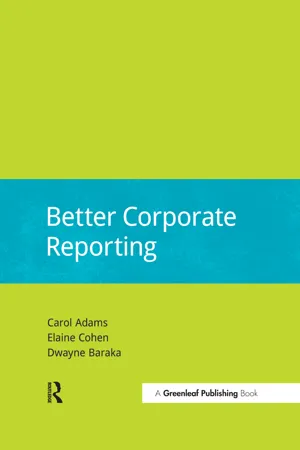
- 331 pages
- English
- ePUB (mobile friendly)
- Available on iOS & Android
Better Corporate Reporting
About this book
Better Corporate Reporting outlines the latest frameworks for enhancing non-financial and sustainability reporting. It shows you how to integrate non-financial data into your reporting and overall strategy, creating long-term value, trust and transparency. It includes guides to: the International Integrated Reporting Council's new framework; the Global Reporting Initiative's G4 framework; and a detailed look at the concept at the heart of both of these new frameworks, materiality. It is the compilation of 3 bestselling sustainability guides on sustainability reporting.Understanding Integrated Reporting provides a practical and expert distillation of the new IR framework released by the International Integrated Reporting Council in December 2013. It explains what IR is and how to do it; how it links with other reporting frameworks and what it means in terms of thinking and processes. You'll also get a clear business case for IR and insights and best practice examples from leading integrated reporters.
The Global Reporting Initiative (GRI) G4 Sustainability Reporting Framework was launched in May 2013. In Understanding G4, corporate reporting veteran Elaine Cohen presents an easy-to-follow review of everything any organization needs to know to decide whether to use the G4 Framework and if so, how.
Materiality is the lynch-pin that can align your sustainability initiatives with your overall strategy. Making Sustainability Matter shows you how to identify your organization's most material sustainability issues, allocate resources to sustainability initiatives for optimal returns; connect your communications and reporting to materiality, and; clarify which issues are important to your stakeholders. Materiality is a core concept in both the GRI's new G4 framework the IIRC's new Integrated Reporting framework.
Tools to learn more effectively

Saving Books

Keyword Search

Annotating Text

Listen to it instead
Information
Making Sustainability Matter
Email: dwayne.baraka@valuecsr.com
Tel: +44 75 9011 6051
Abstract
- waste resources on sustainability programmes that are not strategically aligned to the organisation,
- do not have optimal returns on sustainability investments,
- do not meet the needs of stakeholders, or
- have programmes that cannot be communicated effectively to generate trust and give transparency that matters.
About the Author

Author Note and Acknowledgements
- Elaine Cohen
- Eileen Donnelly
- Ian Gearing
- David Grayson
- Rowland Hill
- Thomas Odenwald
- Rachel Parihk
Who This Book Is For
| If you are: | This book will help you: |
| A sustainability professional | Embed sustainability into business as usual, and begin the journey of calculating the business case for sustainability |
| An executive | Understand a process for integrating sustainability into organisational strategy, performance and communications |
| Responsible for sustainability Reporting | To allocate sustainability resources for better reporting and more effective communication with stakeholders |
| An investor | Understand a business-focused process for identifying material sustainability issues |
| Tasked with ensuring G4 compliance | Report materiality processes effectively and to the level required to achieve G4 compliance |
Navigating this book
- ✓ Observations
- ✓ Reminders
Table of contents
- Cover
- Title
- Copyright
- Contents
- Understanding Integrated Reporting
- Understanding G4
- Making Sustainability Matter
- Conclusion
- Appendix A: Sustainability Team Questions
- Appendix B: Sustainability Issues Record
- Appendix C: Common Material Sustainability Issues
- Appendix D: Further Resources
- Notes
Frequently asked questions
- Essential is ideal for learners and professionals who enjoy exploring a wide range of subjects. Access the Essential Library with 800,000+ trusted titles and best-sellers across business, personal growth, and the humanities. Includes unlimited reading time and Standard Read Aloud voice.
- Complete: Perfect for advanced learners and researchers needing full, unrestricted access. Unlock 1.4M+ books across hundreds of subjects, including academic and specialized titles. The Complete Plan also includes advanced features like Premium Read Aloud and Research Assistant.
Please note we cannot support devices running on iOS 13 and Android 7 or earlier. Learn more about using the app